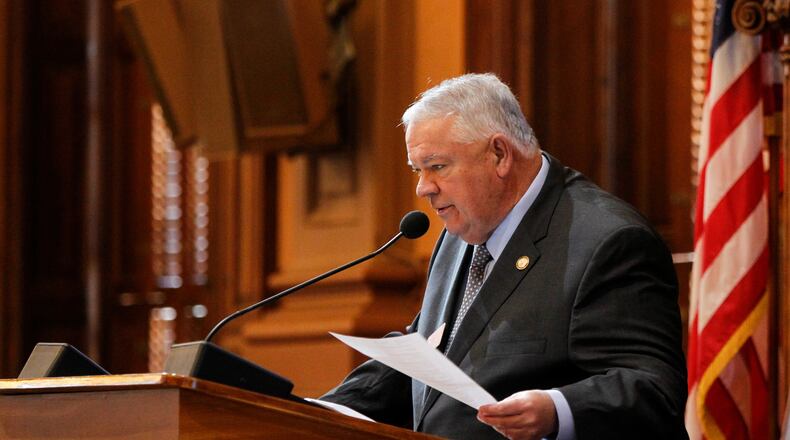Georgia lawmakers are concerned enough about the financial future of the retirement system for teachers that this year they discussed slowing cost-of-living raises for pensioners.
They don’t necessarily have the same concern about their own pension system.
Just after midnight, on the last legislative day bills are required to be approved by at least one chamber, the House passed a measure that could nearly double the pension of some lawmakers.
The legislation would boost House Speaker David Ralston's potential pension by nearly 400 percent.
The Senate Retirement Committee held a hearing on the bill Tuesday, but members said they wanted to study it a little more before making a decision.
"I think there will be some discussion about this thing down the road to make sure we are comfortable about what we are doing," said Senate Retirement Chairman Ellis Black, R-Valdosta.
In an election year, the bill might be a tough sell, but it passed the House last week 117-42.
The measure comes amid concerns from lawmakers that they may have to make changes to the pension system for teachers after the General Assembly was forced to make nearly $600 million in extra payments into the fund over the past two sessions to help improve its financial soundness.
The legislative pension system is facing no such financial questions.
The relatively tiny Legislative Retirement System is part of the state’s much larger Employee Retirement System, which provides pensions for state employees.
Unlike the funds for state employees and teachers, the Legislative Retirement System has long had more than enough assets to make sure all retired lawmakers get what they are promised.
While the employees fund had 76 percent of the money needed to pay its future liabilities — payments to retirees — and the teachers fund about 79 percent, the system for lawmakers had 127 percent of what was needed, as of the end of fiscal 2017.
The legislative system, like those for other employees, is funded partially by payroll deductions and partially by the state, which kicks in about $600,000 a year.
The benefits for lawmakers are fairly small because being a member of the General Assembly is considered a part-time job.
Lawmakers vest after eight years of service, and they get $36 a month for every year they are in the House and/or Senate. So, for instance, a retiring lawmaker such as state Rep. Earl Ehrhart, R-Powder Springs, who has served 30 years, would be eligible for a $1,080 a month pension when he reaches retirement age.
Unlike other part-time state employees, lawmakers and retired legislators also receive state-subsidized health insurance through the State Health Benefit Plan, which covers more than 650,000 Georgia teachers, employees, retirees and their dependents.
Under House Bill 624, sponsored by House Retirement Chairman Paul Battles, R-Cartersville, lawmakers would be eligible to receive 38 percent of their highest salary or $50 per month per year of service as a pension. It would increase the contribution of lawmakers to at least help pay for the higher pension.
Most state lawmakers are paid $17,342 a year, plus $173 per day they are in session or doing committee work.
Currently, a lawmaker like Battles, who is retiring at the end of this year after eight years, would be eligible for a pension of about $3,400 a year. Under Battles’ bill, that pension would go to $6,600 a year.
Battles never signed up for the pension, so he wouldn’t benefit from the bill if it passes.
“This does not bring any benefit to me whatsoever,” Battles said. “This (bill) is designed to deal fairly with legislators in the only retirement system we’ve got.”
Ralston — or any House speaker — would be the biggest beneficiary. The speaker is paid $99,000 a year.
Ralston is running for re-election, but if he didn’t return next year, his pension would be worth about $9,500 annually because it would be calculated the same way as any other legislator — based on years of service. Under Battles’ bill, the pension would rise to $37,620 a year because it would be based on a percentage of his salary.
State Rep. Scott Holcomb, D-Atlanta, was among the Democrats and Republicans who voted against the bill last week.
“It makes me uncomfortable voting for something that is directly in our own interest,” Holcomb said. “I think a lot of citizens would be shocked that we even get retirement (benefits).”
Holcomb also said it didn’t feel right to approve a benefit increase for lawmakers when teachers aren’t getting a state-supported pay raise this year.
He expressed some sympathy for complaints from lawmakers who have long said they are underpaid for the work they do. Ralston has said the low pay for a job that can take up a lot of time outside of the 40-day legislative session forces many lawmakers to quit the General Assembly to earn a decent living.
Late last year a commission recommended giving lawmakers $12,000 raises and bumping the speaker’s pay from $99,000 to $135,000.
The panel also recommended the speaker be allowed to receive a pension from the Employee Retirement System. The Senate’s president, the lieutenant governor, is already eligible to be part of the system, so his pension will be much higher than that of lawmakers.
OUR FINDINGS
Georgia lawmakers, who have long complained about the low pay of the part-time job, are considering substantial increases in their pensions.
At the same time, they are talking about ways to slow the growth of the pension system for the state’s teachers to keep it viable.
Unlike the fund for state employees, and for teachers, the legislative retirement system has long had more than enough assets to make sure all retired lawmakers get what they are promised.
Never miss a minute of what's happening in Georgia Politics. Subscribe to PoliticallyGeorgia.com.
About the Author
Keep Reading
The Latest
Featured




